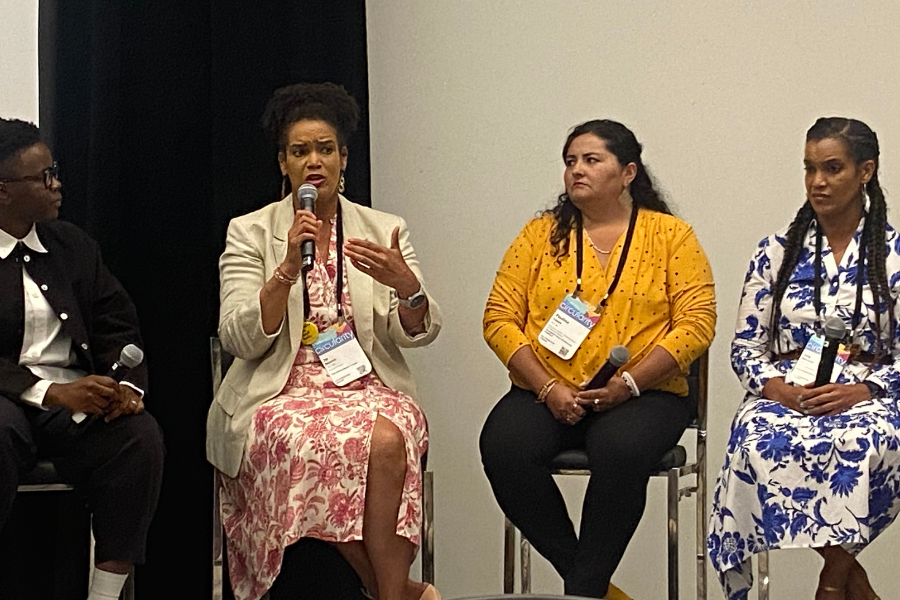
Speakers on the “Frontline Communities” panel included (from left) Sandra Gonza, Jo Banner, Paulina Lopez and Joy Banner. | Dan Leif/Plastics Recycling Update
As companies across the sector try to navigate concerns around environmental justice, leaders of activist groups have some advice: Stop and listen to the local community first.
The initial step in the conversation may just be getting a handle on whether locals want an operation in their vicinity at all.
“The first thing is you need to do is ask – because we might not want you,” Jo Banner, founder and director of Louisiana-based nonprofit The Descendants Project, said during a panel at the Circularity conference in Seattle earlier this month. “’No’ may be the answer, and you should accept that instead of trying to play the politics and removing agency from the community.”
Jo Banner and her sister Joy were two panelists on the June 6 Circularity discussion “Shining a Light on Frontline Communities,” which gave community organizers an opportunity to speak directly to companies across the materials value chain.
Operators in waste and recycling (and many other industries) are trying to walk an increasingly complicated line on environmental justice. Regulators at all levels of government, including the U.S. EPA, have in recent years put a greater emphasis on ensuring that industrial enterprises take steps to minimize health and environmental impacts on lower-income and traditionally marginalized populations.
This has come alongside the growing environmental, social, governance (ESG) trend in the corporate sphere, where companies are attempting to mitigate negative impacts on people and the planet, often by way of public-facing targets and reporting.
But what panelists at the “Frontline Communities” session made very clear was that real movement on environmental justice is often a slow process, with affected populations sometimes having very little trust in the companies pledging to do better.
“We’re expected to sit at the table with our traumatizers,” Jo Banner said. “It may require slowing down a lot taking time to build that trust. This is just about all the companies that have come in and lied.”
The view from ‘Cancer Alley’
The Descendants Project is dedicated to supporting communities of slave descendants along the Mississippi River in Louisiana. The organization has raised alarms about health concerns tied to petrochemical production in areas of the Gulf Coast, an area they and other groups have dubbed “Cancer Alley.”
The Banner sisters expressed frustration at the way large companies have assumed economically disadvantaged communities would welcome industrial projects offering jobs and other financial resources.
“You being there is contingent upon the community agreeing to have you there,” Joy Banner said. “If they don’t agree to that, it’s time to move on.”
Paulina Lopez, executive director of the Duwamish River Community Coalition in the Seattle area, said she expects companies wanting to establish operations in her area to build local partnerships based on “the three H’s”: help, heal and be human.
If those principles are not met, she noted, no amount of economic benefit is going to bring support from an organization like hers.
“I don’t want your jobs where I am breathing lead and arsenic,” she said. “We want people to go work for responsible companies.”
Sandra Gonza, a consultant who has experience working with East African communities that receive shipments of used textiles, added that even if a community is open to a project, companies should be ready for hard dialogue.
She recommended entering into an “exploratory phase,” a period in which local groups, government officials and company leaders should all be prepared to discuss the full range of impacts and concerns.
“Don’t just talk about positives, also discuss potential negatives,” said Gonza. “Have an honest dialogue.”
Disappointment at global plastic talks
The Banner sisters of The Descendants Project traveled to the Seattle conference straight from Paris, where they had participated in the second meeting of the Intergovernmental Negotiating Committee on Plastic Pollution.
That UN-backed initiative has in many ways exemplified the complexities surrounding environmental justice in the wider sustainability conversation, especially in relation to plastics.
Jo Banner said that the emphasis of the INC is on marine debris, and in her view the realities of plastic production have not been talked about enough.
“Environmental justice is not in the same conversation – it’s disappointing,” she said. “It was also disappointing to see how many nations are collaborating to shut us down. We have seen this agreement among nations to just not give us the floor.”
As the environmental justice conversation continues, it’s clear stakeholders will need to find a balance among conflicting priorities.
Lopez of the Duwamish River Community Coalition has hope that businesses can continue to evolve, lifting community members at the same time.
“I don’t want industries to close their doors,” she said. “I want them to be good neighbors – being ethical and doing the right thing for the community to thrive.”
A version of this story appeared in Resource Recycling on June 20.


